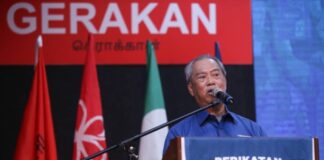KUALA LUMPUR, Aug 23 — Pharmaniaga Bhd says it is all geared up to make the necessary changes to its existing plants that would enable them to undertake fill and finish process for COVID-19 vaccine as soon as it is developed, its acting managing director, Mohamed Iqbal Abdul Rahman said.
He said the group had presented to the National Science Council its plan, capacity and capabilities for the purpose.
“This is part of the short-term plan of the group in addressing the urgent need for the COVID-19 vaccine,” he told Bernama in a written reply when asked on Pharmaniaga’s future plans.
Last month, Science, Technology and Innovation Minister Khairy Jamaluddin said the government had agreed that the facilities owned by Duopharma Biotech Bhd and Pharmaniaga be used for bottling the vaccine.
Khairy reportedly explained that the two companies were chosen as both are government-linked — Duopharma is owned by Permodalan Nasional Bhd and Pharmaniaga is owned by Boustead Holdings Bhd — and currently have unused capacity that can be directed towards this purpose.
Going forward, Mohamed Iqbal said Pharmaniaga, Malaysia’s largest pharmaceutical company, was on track to establish the world’s first halal vaccine facility, targeted for completion by 2022.
“In 2018, Pharmaniaga announced plans to establish a vaccine plant. We have since completed conducting the necessary due diligence and secured partnerships with international vaccine producers,” he said.
In addition, Pharmaniaga has long-term plans for sustainable growth and has put in place six strategic thrusts to drive the company to the next level.
As a government-linked company, Pharmaniaga is committed to continuously provide the highest standard of service to allow the Ministry of Health to focus on healthcare delivery, with Pharmaniaga as its preferred logistics partner.
“Although we have secured a logistics and distribution contract until November 2024, we are hopeful that our proven track record, ready infrastructure, integrated information technology, and most importantly, experienced human capital, will position us well to secure a potential extension following this period,” he said.
Mohammed Iqbal said Pharmaniaga also benefitted significantly from the group’s digitalisation efforts which have taken place over the past few years, ensuring minimal disruptions during the Movement Control Order (MCO) period.
In an effort to augment the group, he said Pharmaniaga will also be expanding its product portfolio with new products to be manufactured in-house, as well as strengthen its agency and distributorship segment and expand its one-stop centre facilitation.
“With over 300 alliances and more than 6,000 private hospitals, general practitioners and pharmacy outlets, Pharmaniaga has a very strong base to build on and further strengthen customer loyalty,” he added.
Additionally, in an effort to strengthen human capital, the group will continue to equip its employees with the necessary training and support to comply with all regulatory and statutory requirements.
“With a workforce of more than 3,500, our human capital is our most valuable asset. We are also committed to prioritising local employment, with a workforce comprising 99.5 per cent locals, supported by specialised international talent mainly in our research and development team.
“We are also adapting to the ‘new normal’ post- COVID-19 and harnessing positive learnings from the MCO. Online meetings and work from home have given us the opportunity to ‘do more for less’ as we have less travelling cost and more productive time,” he added.
For the six-month financial period ended June 30, 2020, Pharmaniaga recorded a net profit of RM32.38 million as compared with RM28.89 million year-on-year (y-o-y), while revenue jumped to RM1.47 billion versus RM1.39 billion registered in the same period in 2019.
He said despite recording revenue growth y-o-y, the group’s Indonesian operations have been loss-making over the years, although there has been some slight improvement.
During the second quarter of 2020 especially, the Indonesia division recorded a deficit of RM2 million, mainly due to higher finance costs as a result of the delay in payments from government hospitals, currently affecting Indonesia’s healthcare industry.
“The division was further impacted by the republic’s large-scale social restrictions in response to the COVID-19 pandemic, which resulted in limited access to doctors, clinics, pharmacies and hospitals,” it said in a filing to Bursa Malaysia.
Mohamed Iqbal said to mitigate this, the company is seeking solutions to manage the delays in payment by government hospitals for the distribution business.
As for the manufacturing facility in Bandung, Pharmaniaga had expanded its sales channels, with a view to breaking even in 2021, and hopefully, returning to profitability over the longer term, he added.
















